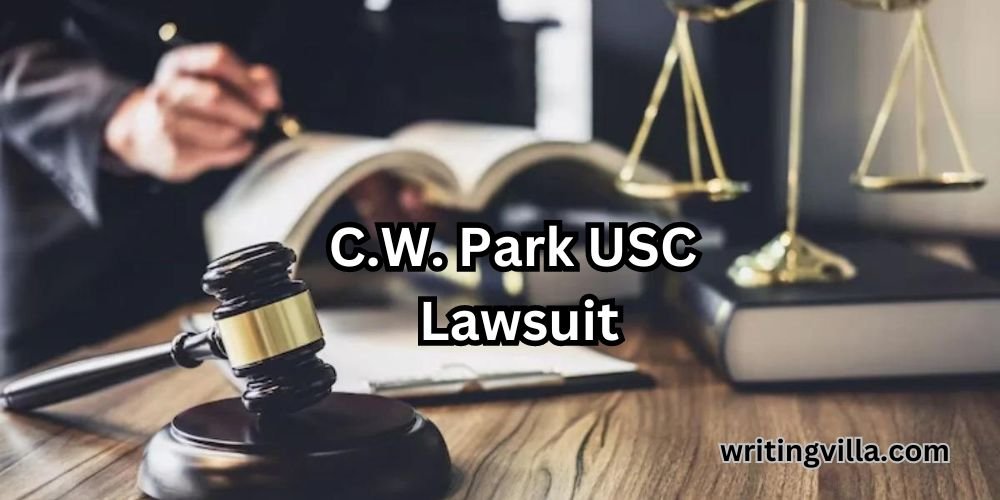The C.W. Park USC Lawsuit and the University of Southern California (USC) has captured significant attention within the academic community and beyond. This high-profile case touches on critical issues of academic freedom, institutional integrity, and legal accountability. Understanding the intricacies of this lawsuit is crucial for grasping its potential impact on academia and legal precedents.
Who is C.W. Park USC Lawsuit?
C.W. Park is a distinguished academic known for his extensive marketing and business strategy contributions. As a professor at USC, Park has authored numerous influential papers and has been recognized for his innovative research and teaching methods. His career spans several decades, during which he has earned a reputation for excellence and thought leadership in his field.
University of Southern California (USC) Overview
One of the most prominent private research universities in the country is the University of Southern California. Founded in 1880, USC has a long history of academic achievement and is renowned for its diverse programs, cutting-edge research, and influential alums. The university is a cornerstone of higher education in California and plays a significant role in shaping future leaders.
Details of the Lawsuit
The lawsuit filed by C.W. Park against USC revolves around allegations of wrongful termination, breach of contract, and defamation. Park claims that his dismissal from the university was unjust and that USC failed to honor the terms of his employment contract. Additionally, Park alleges that statements made by university officials damaged his professional reputation.
Context and Background
The roots of this lawsuit can be traced back to a series of events involving disagreements between Park and the university administration. Tensions reportedly escalated over academic policies, funding allocations, and departmental governance. These disputes culminated in Park’s termination, which he contends was a retaliatory act for his outspoken views and actions.
Legal Framework
The lawsuit involves several vital legal principles, including employment, contract, and defamation laws. Employment law governs the rights and obligations between employers and employees, while contract law pertains to the enforceability of agreements. Defamation law addresses false statements that harm an individual’s reputation. Legal precedents in these areas will be crucial to the case’s outcome.
Plaintiff’s Perspective
From Park’s perspective, the lawsuit is a fight for justice and professional vindication. He argues that his termination was not only wrongful but also a violation of his contractual rights. Park’s legal team has presented evidence, including internal communications and witness testimonies, to support his claims of retaliation and defamation.
USC’s Defense
USC’s defense centers on the argument that Park’s termination was justified based on performance issues and violations of university policies. The university maintains that it acted within its legal rights and followed proper procedures. USC’s legal representatives have submitted evidence to disprove Park’s allegations and demonstrate the legitimacy of their actions.
Impact on Academic Community
The lawsuit has sparked widespread debate within the academic community. Faculty members and students have expressed varied reactions, ranging from support for Park’s stance to concerns about the university’s handling of the situation. The case raises important questions about academic freedom, institutional governance, and the balance of power within educational institutions.
Public Reaction and Media Coverage
The media has closely followed the lawsuit, with numerous outlets reporting on its developments. Public opinion is divided, with some viewing Park as a whistleblower standing up against institutional wrongdoing, while others see USC’s actions as justified. The case’s high-profile nature has ensured it remains a topic of ongoing discussion.
Possible Outcomes
The potential outcomes of the lawsuit are varied. If Park prevails, he could be awarded damages for wrongful termination and defamation, and USC might face reputational damage. Conversely, if USC wins, the university’s actions will be validated, potentially setting a precedent for handling similar disputes. Both parties have much at stake, making the case’s resolution highly consequential.
Expert Opinions
Legal experts have weighed in on the lawsuit, offering insights into its complexities and likely trajectories. Some believe Park has a strong case based on the evidence presented, while others argue that USC’s defense is robust. Academic experts have also discussed the broader implications for university governance and faculty rights.
Similar Cases in Academia
This lawsuit is not an isolated incident; other notable academic cases have involved similar wrongful termination and defamation issues. These cases provide valuable lessons and highlight educational institutions’ ongoing challenges in managing faculty relations and upholding legal and ethical standards.
Future Implications
The lawsuit’s long-term effects will extend beyond the immediate parties involved. For USC, the outcome could influence its policies and procedures regarding faculty employment and governance. The case may prompt other academic institutions to reassess their practices to prevent similar conflicts and ensure compliance with legal standards.
FAQs about C.W. Park USC Lawsuit
Q: What is the main issue in the C.W. Park USC lawsuit?
A: The lawsuit centers on allegations of wrongful termination, breach of contract, and defamation, with C.W. Park claiming his dismissal was unjust and damaged his professional reputation.
Q: How has USC responded to the allegations?
A: USC has defended its actions by arguing that Park’s termination was justified based on performance issues and violations of university policies.
Q: What are the potential outcomes of the lawsuit?
A: Possible consequences include Park being awarded damages if he prevails or USC’s actions being validated if the university wins, each scenario carrying significant implications for both parties.
Q: How has the academic community reacted to the lawsuit?
A: Reactions within the educational community have been mixed, with some supporting Park’s stance and others concerned about the university’s handling of the situation.
Q: What are the broader implications for academic institutions?
A: The case underscores the importance of clear policies and fair practices in managing faculty relations and may prompt other institutions to reassess their procedures to prevent similar disputes.
Conclusion
The C.W. Park USC lawsuit is a complex and multifaceted case with significant implications for the academic community and beyond. It highlights critical academic freedom, institutional governance, and legal accountability issues. As the case unfolds, its outcome will undoubtedly shape future practices and policies within higher education.
Latest Post!
- Full-Service Pool Salons: A Blend of Quality and Affordability
- Ensure Identity Theft Protection with Advanced Biometric Verification Measures
- Discover the Best Rooms for Rent in Your Area: A Comprehensive Guide
- eTruesports Tech: Revolutionizing the World of Sports
- Tacko SFM Version Mega.nz: A Comprehensive Guide
- FintechZoom GME Stock Forecast: A Comprehensive Guide








